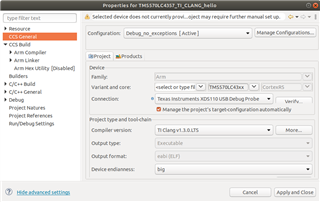Other Parts Discussed in Thread: HALCOGEN
My question is if the TMS570LC4357 MCU is compatible with using the TI Arm Clang compiler which we would like to use for its compatibility with GCC tooling.
I have been able to successfully create a Hello World program that compiles and links based on this forum post: https://e2e.ti.com/support/tools/code-composer-studio-group/ccs/f/code-composer-studio-forum/998144/ti-arm-clang-compiler-tools-user-s-guide-v1-3-description-of-run-time-library-selection-seems-incorrect
However, the program does not execute correctly on the target. The program appears to never enter main and instead aborts during _c_int00
Can someone provide a simple hello world example program that compiles, links, and executes for the TMS570LC4357 MCU using the TI Arm Clang Compiler or let me know if the Clang compiler is not yet supported for this board?
Thank you in advance



